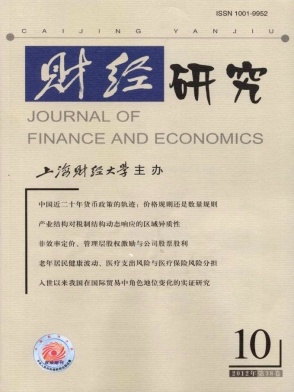非效率定价、管理层股权激励与公司股票股利
财经研究 2012 年 第 38 卷第 10 期, 页码:48 - 57
摘要
参考文献
摘要
文章使用2006-2010年中国上市公司股权激励的数据,检验股权激励方案的实施如何影响公司的股票股利行为。在检验股票股利长期市场反应的基础上,文章发现,实施股权激励的公司更倾向于发放高额股票股利,且股权激励的程度越高,发放高额股票股利的可能性也越大。进一步研究还发现,不同类型的股权激励制度对股票股利政策的影响也有所不同。文章结果表明,在非效率定价的市场环境下,管理层为了自身利益会充分利用市场的非有效定价现象来影响公司的股利行为。
[1]吕长江,郑慧莲,严明珠,等.上市公司股权激励制度设计:是激励还是福利?[J].管理世界,2009,(9):133-147.
[2]李礼,王曼舒,齐寅峰.股利政策由谁决定及其选择动因——基于中国非国有上市公司的问卷调查分析[J].金融研究,2006,(1):74-85.
[3]江伟.董事长过度自信与管理层薪酬——基于中国上市公司的实证分析[J].中大管理研究,2010,(2):64-84.
[4]吴育辉,吴世农.企业高管自利行为及其影响因素研究——基于我国上市公司股权激励草案的证据[J].管理世界,2010,(5):141-149.
[5]Fama E,Fisher L,Jensen M,et al.The adjustment of stock prices to new informa-tion[J].International Economic Review,1969,10(2):1-21.
[6]Grinblatt M,Masulis R,Titman S.The valuation effects of stock splits and stock divi-dends[J].Journal of Financial Economics,1984,13(4):461-490.
[7]Desai H,Jain P.Long-run common stock returns following stock splits and reverse splits[J].Journal of Business,1997,70(3):409-433.
[8]Byun J,Rozeff M.Long-run performance after stock splits:1927to1996[J].Journal of Finance,2003,58(3):1063-1086.
[9]Bartov E,Mohanram P.Private information,earnings manipulations,and executive stock-option exercises[J].The Accounting Review,2004,79(4):889-920.
[10]Cheng Q,Warfield T.Equity incentives and earnings management[J].The Accounting Review,2005,80(2):441-476.
[11]Ikenberry D,Rankine G,Stice E.What do stock splits really signal?[J].Journal of Financial and Quantitative Analysis,1996,31(3):357-375.
[12]Ikenberry D,Ramnath S.Underreaction to self-selected news events:The case of stock splits[J].Review of Financial Studies,2002,15(2):489-526.
[13]Baker H,Gallagher P.Management’s view of stock splits[J].Financial Management,1980,9(2):73-77.
[2]李礼,王曼舒,齐寅峰.股利政策由谁决定及其选择动因——基于中国非国有上市公司的问卷调查分析[J].金融研究,2006,(1):74-85.
[3]江伟.董事长过度自信与管理层薪酬——基于中国上市公司的实证分析[J].中大管理研究,2010,(2):64-84.
[4]吴育辉,吴世农.企业高管自利行为及其影响因素研究——基于我国上市公司股权激励草案的证据[J].管理世界,2010,(5):141-149.
[5]Fama E,Fisher L,Jensen M,et al.The adjustment of stock prices to new informa-tion[J].International Economic Review,1969,10(2):1-21.
[6]Grinblatt M,Masulis R,Titman S.The valuation effects of stock splits and stock divi-dends[J].Journal of Financial Economics,1984,13(4):461-490.
[7]Desai H,Jain P.Long-run common stock returns following stock splits and reverse splits[J].Journal of Business,1997,70(3):409-433.
[8]Byun J,Rozeff M.Long-run performance after stock splits:1927to1996[J].Journal of Finance,2003,58(3):1063-1086.
[9]Bartov E,Mohanram P.Private information,earnings manipulations,and executive stock-option exercises[J].The Accounting Review,2004,79(4):889-920.
[10]Cheng Q,Warfield T.Equity incentives and earnings management[J].The Accounting Review,2005,80(2):441-476.
[11]Ikenberry D,Rankine G,Stice E.What do stock splits really signal?[J].Journal of Financial and Quantitative Analysis,1996,31(3):357-375.
[12]Ikenberry D,Ramnath S.Underreaction to self-selected news events:The case of stock splits[J].Review of Financial Studies,2002,15(2):489-526.
[13]Baker H,Gallagher P.Management’s view of stock splits[J].Financial Management,1980,9(2):73-77.
引用本文
韩慧博, 吕长江, 李然. 非效率定价、管理层股权激励与公司股票股利[J]. 财经研究, 2012, 38(10): 48–57.
导出参考文献,格式为:





 7616
7616  4943
4943

